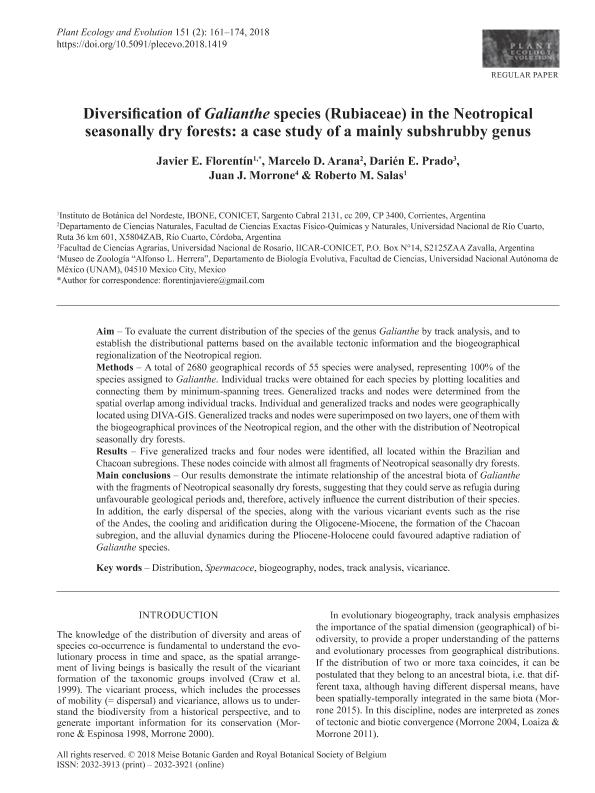Mostrar el registro sencillo del ítem
dc.contributor.author
Florentín, Javier Elias

dc.contributor.author
Arana, Marcelo Daniel

dc.contributor.author
Prado, Darien Eros

dc.contributor.author
Morrone, Juan José

dc.contributor.author
Salas, Roberto Manuel

dc.date.available
2019-08-15T20:15:40Z
dc.date.issued
2018-08
dc.identifier.citation
Florentín, Javier Elias; Arana, Marcelo Daniel; Prado, Darien Eros; Morrone, Juan José; Salas, Roberto Manuel; Diversification of galianthe species (Rubiaceae) in the neotropical seasonally dry forests: A case study of a mainly subshrubby genus; Societe Royale de Botanique de Belgique; Plant Ecology and Evolution; 151; 2; 8-2018; 161-174
dc.identifier.issn
2032-3913
dc.identifier.uri
http://hdl.handle.net/11336/81685
dc.description.abstract
Aim ‒ To evaluate the current distribution of the species of the genus Galianthe by track analysis, and to establish the distributional patterns based on the available tectonic information and the biogeographical regionalization of the Neotropical region. Methods ‒ A total of 2680 geographical records of 55 species were analysed, representing 100% of the species assigned to Galianthe. Individual tracks were obtained for each species by plotting localities and connecting them by minimum-spanning trees. Generalized tracks and nodes were determined from the spatial overlap among individual tracks. Individual and generalized tracks and nodes were geographically located using DIVA-GIS. Generalized tracks and nodes were superimposed on two layers, one of them with the biogeographical provinces of the Neotropical region, and the other with the distribution of Neotropical seasonally dry forests. Results ‒ Five generalized tracks and four nodes were identified, all located within the Brazilian and Chacoan subregions. These nodes coincide with almost all fragments of Neotropical seasonally dry forests. Main conclusions ‒ Our results demonstrate the intimate relationship of the ancestral biota of Galianthe with the fragments of Neotropical seasonally dry forests, suggesting that they could serve as refugia during unfavourable geological periods and, therefore, actively influence the current distribution of their species. In addition, the early dispersal of the species, along with the various vicariant events such as the rise of the Andes, the cooling and aridification during the Oligocene-Miocene, the formation of the Chacoan subregion, and the alluvial dynamics during the Pliocene-Holocene could favoured adaptive radiation of Galianthe species.
dc.format
application/pdf
dc.language.iso
eng
dc.publisher
Societe Royale de Botanique de Belgique
dc.rights
info:eu-repo/semantics/openAccess
dc.rights.uri
https://creativecommons.org/licenses/by/2.5/ar/
dc.subject
Biogeography
dc.subject
Distribution
dc.subject
Nodes
dc.subject
Spermacoce
dc.subject
Track Analysis
dc.subject
Vicariance
dc.subject.classification
Ciencias de las Plantas, Botánica

dc.subject.classification
Ciencias Biológicas

dc.subject.classification
CIENCIAS NATURALES Y EXACTAS

dc.title
Diversification of galianthe species (Rubiaceae) in the neotropical seasonally dry forests: A case study of a mainly subshrubby genus
dc.type
info:eu-repo/semantics/article
dc.type
info:ar-repo/semantics/artículo
dc.type
info:eu-repo/semantics/publishedVersion
dc.date.updated
2019-08-01T20:28:13Z
dc.identifier.eissn
2032-3921
dc.journal.volume
151
dc.journal.number
2
dc.journal.pagination
161-174
dc.journal.pais
Bélgica

dc.description.fil
Fil: Florentín, Javier Elias. Consejo Nacional de Investigaciones Científicas y Técnicas. Centro Científico Tecnológico Conicet - Nordeste. Instituto de Botánica del Nordeste. Universidad Nacional del Nordeste. Facultad de Ciencias Agrarias. Instituto de Botánica del Nordeste; Argentina
dc.description.fil
Fil: Arana, Marcelo Daniel. Universidad Nacional de Río Cuarto. Facultad de Ciencias Exactas Fisicoquímicas y Naturales; Argentina
dc.description.fil
Fil: Prado, Darien Eros. Universidad Nacional de Rosario. Facultad de Ciencias Agrarias; Argentina. Consejo Nacional de Investigaciones Científicas y Técnicas. Centro Científico Tecnológico Conicet - Rosario. Instituto de Investigaciones en Ciencias Agrarias de Rosario. Universidad Nacional de Rosario. Facultad de Ciencias Agrarias. Instituto de Investigaciones en Ciencias Agrarias de Rosario; Argentina
dc.description.fil
Fil: Morrone, Juan José. Universidad Nacional Autonoma de Mexico. Facultad de Ciencias; México
dc.description.fil
Fil: Salas, Roberto Manuel. Consejo Nacional de Investigaciones Científicas y Técnicas. Centro Científico Tecnológico Conicet - Nordeste. Instituto de Botánica del Nordeste. Universidad Nacional del Nordeste. Facultad de Ciencias Agrarias. Instituto de Botánica del Nordeste; Argentina
dc.journal.title
Plant Ecology and Evolution
dc.relation.alternativeid
info:eu-repo/semantics/altIdentifier/doi/http://dx.doi.org/10.5091/plecevo.2018.1419
dc.relation.alternativeid
info:eu-repo/semantics/altIdentifier/url/https://www.plecevo.eu/index.php/plecevo/article/view/1419
Archivos asociados
